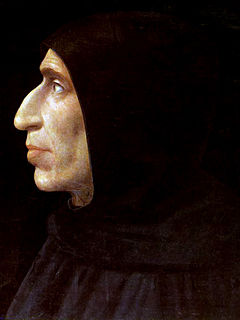A Quote by Julian of Norwich
We are kept all as securely in Love in woe as in weal, by the Goodness of God.
Related Quotes
Woe to him whom this world charms from Gospel duty. Woe to him who seeks to pour oil upon the waters when God has brewed them into a gale. Woe to him who seeks to please rather than to appal. Woe to him whose good name is more to him than goodness. Woe to him who, in this world, courts not dishonor! Woe to him who would not be true, even though to be false were salvation. Yea, woe to him who, as the great Pilot Paul has it, while preaching to others is himself a castaway.
God is goodness itself, in whom all goodness is involved. If therefore we love other things for the goodness which we see in them, why do we not love God, in whom is all goodness? All other things are but sparks of that fire, and drops of that sea. If you see any good in the creature, remember there is much more in the Creator. Leave therefore the streams, and go to the fountainhead of comfort.
God has no needs. Human love, as Plato teaches us, is the child of Poverty – of want or lack; it is caused by a real or supposed goal in its beloved which the lover needs and desires. But God's love, far from being caused by goodness in the object, causes all the goodness which the object has, loving it first into existence, and then into real, though derivative, lovability. God is Goodness. He can give good, but cannot need or get it. In that sense , His love is, as it were, bottomlessly selfless by very definition; it has everything to give, and nothing to receive.
There are still people who insist that we have to preach on repentance. Well, I disagree! I think we should do it God’s way – preach the goodness of God and allow the goodness of God to lead people to repentance. Such repentance will be true repentance. It will not be motivated by the fear of judgment and indignation. It will be a genuine repentance that is motivated by His grace, unconditional love and compassion. After all, our ability to love God stems from our first tasting His love for us.
The only thing that really matters is that there be an action of goodness, love and intelligence in living. Is goodness individual or collective, is love personal or impersonal, is intelligence yours, mine or somebody else? If it is yours or mine then it is not intelligence, or love, or goodness. If goodness is an affair of the individual or of the collective, according to one's particular preference or decision, then it is no longer goodness.
There are three kinds of love;
unselfish, mutual, and selfish.
The unselfish love is of the highest kind;
The lover only minds the welfare of the beloved and does not care for his own sufferings.
In mutual love the lover not only wants the happiness of his beloved;
but has an eye towards his own happiness also. It is middling.
The selfish love is the lowest. It only looks towards its own happiness,
no matter whether the beloved suffers weal or woe.
Song in the Manner of Housman" O woe, woe, People are born and die, We also shall be dead pretty soon Therefore let us act as if we were dead already. The bird sits on the hawthorn tree But he dies also, presently. Some lads get hung, and some get shot. Woeful is this human lot. Woe! woe, etcetera.... London is a woeful place, Shropshire is much pleasanter. Then let us smile a little space Upon fond nature's morbid grace. Oh, Woe, woe, woe, etcetera.
Because the divine goodness could not be adequately represented by one creature alone, God produced many and diverse creatures, that what was wanting in one in the representation of the divine goodness might be supplied by another. For goodness, which in God is simple and uniform, in creatures is manifold and divided. Thus the whole universe together participates in the divine goodness more perfectly and represents it better than any single creature.

































